初中英语语法一般现在时专项讲解及练习
一般现在时知识点详解及练习(145题 含解析 页)初中英语专题复习
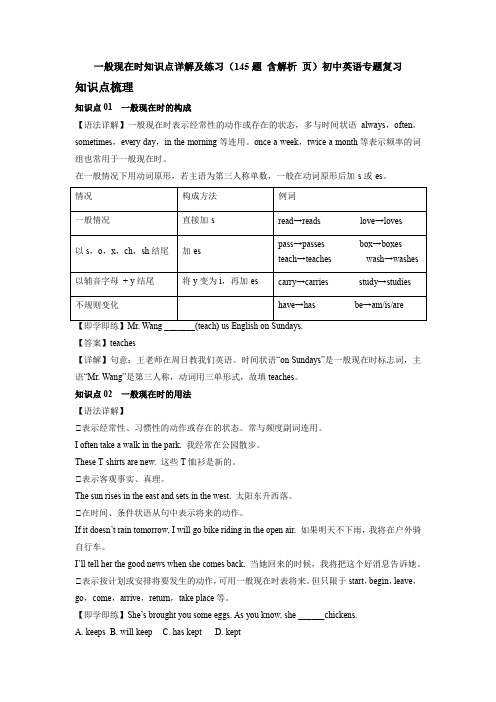
一般现在时知识点详解及练习(145题含解析页)初中英语专题复习知识点梳理知识点01 一般现在时的构成【语法详解】一般现在时表示经常性的动作或存在的状态,多与时间状语always,often,sometimes,every day,in the morning等连用。
once a week,twice a month等表示频率的词组也常用于一般现在时。
在一般情况下用动词原形,若主语为第三人称单数,一般在动词原形后加-s或-es。
【答案】teaches【详解】句意:王老师在周日教我们英语。
时间状语“on Sundays”是一般现在时标志词,主语“Mr. Wang”是第三人称,动词用三单形式,故填teaches。
知识点02 一般现在时的用法【语法详解】①表示经常性、习惯性的动作或存在的状态。
常与频度副词连用。
I often take a walk in the park. 我经常在公园散步。
These T-shirts are new. 这些T恤衫是新的。
①表示客观事实、真理。
The sun rises in the east and sets in the west. 太阳东升西落。
①在时间、条件状语从句中表示将来的动作。
If it doesn’t rain tomorrow, I will go bike riding in the open air. 如果明天不下雨,我将在户外骑自行车。
I’ll tell her the good news when she comes back. 当她回来的时候,我将把这个好消息告诉她。
①表示按计划或安排将要发生的动作,可用一般现在时表将来。
但只限于start,begin,leave,go,come,arrive,return,take place等。
【即学即练】She’s brought you some eggs. As you know, she ______chickens.A. keepsB. will keepC. has keptD. kept【详解】句意:她给你带了些鸡蛋。
一般现在时用法及专项练习

一般现在时(the simple present tense)一、定义是一种英语语法形式,表示规律性、通常性、习惯性、真理性的动作或状态。
二、结构(一)肯定句1. 主语 + be 动词(am/is/are)+ 其他。
例如:I am a student.(我是一名学生。
)2. 主语 + 动词原形。
例如:We play basketball on weekends.(我们在周末打篮球。
)3.主语(第三人称单数)+动词第三人称单数形式。
一般在动词词尾加 -s 或 -es。
例如:He plays football after school.(他放学后踢足球。
)Tom usually goes to school at 7:30.(汤姆通常7点半去学校。
)(二)否定句1. 主语 + be 动词(am/is/are)not +其他。
例如:I am not a student.(我不是一名学生。
)2. 主语 + do not(don’t) +动词原形。
例如:We do not play basketball on weekends.(我们周末不打篮球。
)3.主语(第三人称单数)does not(doesn’t )+动词原形。
例如:He does not play football after school.(他放学后不踢足球。
)(三)一般疑问句1. Be动词+主语+其他?例如:Is she a student?(她是学生吗?)2. Do/Does + 主语 + 动词原形?例如:Do you play football after school? (你放学后踢足球吗?)Does he work here? (他在这里工作吗?)三、用法1. 描述习惯或重复动作:常与表示频率的时间状语连用。
例如:I get up at 6 o'clock every morning. (我每天早上六点起床。
)He goes to school by bus. (他乘公共汽车上学。
(完整版)初中英语语法一般现在时专项讲解及练习
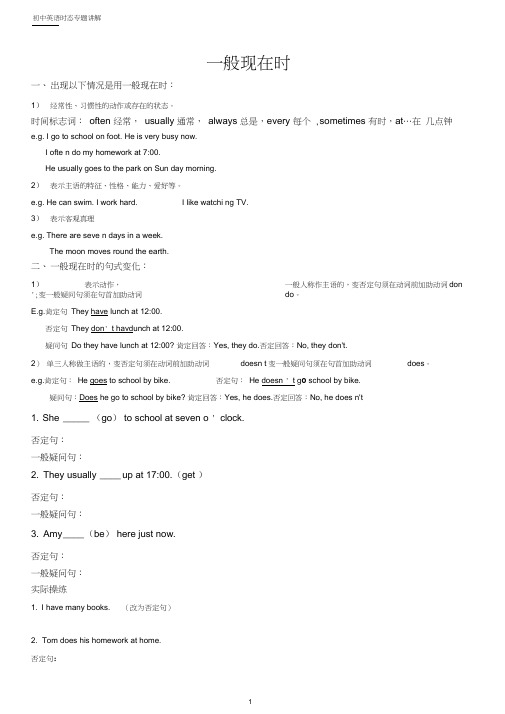
一般现在时一、出现以下情况是用一般现在时:1)经常性、习惯性的动作或存在的状态。
时间标志词:often 经常,usually 通常,always 总是,every 每个 ,sometimes 有时,at…在几点钟e.g. I go to school on foot. He is very busy now.I ofte n do my homework at 7:00.He usually goes to the park on Sun day morning.2)表示主语的特征、性格、能力、爱好等。
e.g. He can swim. I work hard. I like watchi ng TV.3)表示客观真理e.g. There are seve n days in a week.The moon moves round the earth.二、一般现在时的句式变化:1)表示动作,一般人称作主语的,变否定句须在动词前加助动词don ';变一般疑问句须在句首加助动词do。
E.g.肯定句They have lunch at 12:00.否定句They don' t havdunch at 12:00.疑问句Do they have lunch at 12:00? 肯定回答:Yes, they do.否定回答:No, they don't.2)单三人称做主语的,变否定句须在动词前加助动词doesn t变一般疑问句须在句首加助动词does。
e.g.肯定句:He goes to school by bike. 否定句:He doesn ' t g o school by bike.疑问句:Does he go to school by bike? 肯定回答:Yes, he does.否定回答:No, he does n't1. She _____ (go) to school at seven o ' clock.否定句:一般疑问句:2. They usually ____ up at 17:00.(get )否定句:一般疑问句:3. Amy ____ (be) here just now.否定句:一般疑问句:实际操练1. I have many books. (改为否定句)2. Tom does his homework at home.否定句:一般疑问句:3. Mingming usually waters the flowers.否定句: 一般疑问句4.Su Yang usually washes some clothes on Saturday.否定句:5. I usually play football on Friday after noon.否定句: 般疑问句:( )1. _____ you have a book? A. DoB. AreC. IsD. Have( )2. They ________ on a farm. A.are worki ngB. is workC. worki ngD. is worked()3. Does Peter like to watch TV? _________ .( )6. Where ' s my camera? I _____________ it.强化训练一、写出下列单词的第三人称单数形式clean _________ write ___________ guess _________ watch ___________cry _________ play ______________A. Yes, he likeB. No, he doe sn 'tC. Yes, he ' d likeD. No, he likes ()4. She doesn ' t her homework in the after noon. A. doing B. to do C. does D. do()5. HowMr. Brow n __________ to America?A. do, goB. is, goC. does, go1. My classmate ____ (know) the man on the bike.2. His sister usually _____ (go) to school at 7:00 am.C. can ' t find D. can ' t look at( )7. How he go to work? HeA. does; goB. do; goesC. do ; go ( )8.you usually late for school? No,A . Do; I am B. Does ;not( )9.she home at six every day?A . Is , leave B. Does ,leave( )10. Mr. Yang En glish this term.A . teaches our B. teaches usto work by bike.D.does; goesC. Are ; I ' m notD. Are ; I aren 'tC. Is , leavesD. Does , leftC. teachs usD. teach ourA. am not findingB. am not see ing 三•用所给动词的适当形式填空。
一般现在时知识点梳理及经典练习(超详细)

一般现在时知识点梳理及经典练习(超详细)一、初中英语一般现在时1.—This bed is too big for Jack's bedroom.—Yes.it too much space.A. looks forB. depends onC. takes upD. throws away【答案】C【解析】【分析】句意:这个床对于杰克的房间来说太大了。
这个床占据了太多空间。
takes up占据。
故C选项正确。
【点评】考查动词短语的辨析。
2.The children will climb the mountain if it________ tomorrow.A. won't rainB. didn't rainC. isn't rainingD. doesn't rain【答案】 D【解析】【分析】句意:如果明天不下雨,孩子们会去爬山。
if 引导的条件状语从句遵循主将从现的原则,主句用一般将来时,从句用一般现在时,从句是一个否定句,含有实义动词rain的否定句,要借助助动词don't/doesn't构成,主语是it,助动词用doesn't,故选D。
【点评】考查if引导的条件状语的时态。
注意句子涉及到if引导的条件状语从句的用法。
3.—Let's go fishing if it ____ this weekend.—But nobody knows if it ____.A. is fine; will rainB. will be rain; rainsC. will be fine; will rainD. is fine; rains 【答案】 A【解析】【分析】句意:——如果本周末天晴,我们一起去钓鱼吧。
——但是没人知道是否下雨。
第一空if引导条件状语从句,条件状语从句遵循主将从现的原则,从句用一般现在时表将来时,故排除BC,第二空前knows后引导宾语从句,描述将来发生的事情,用一般将来时,其结构为will+动词原形,故选A。
初中一般现在时【讲解+练习】

一般现在时的用法一、概述一般现在时表示习惯性、经常性、反复性的动作或存有的状态。
“习惯性、经常性、反复性”是一般现在时的三大特性,它不表示特定时间内发生的事。
二、一般现在时的结构时态的结构指的是动词的变化形式。
一般现在时间有两种结构,一种是动词原形,用于主语为非第三人称时的情况;另一种为动词的第三人称单数形式,用于主语为第三人称时的情况。
Eg1.We often get up early in the morning.Eg2.My father often gets up early in the morning.三、谈谈“主语为三单,其后动词s添”在一般现在时中,当主语为第三人称单数时,谓语动词要用第三人称单数形式。
能够简单叙述为“主语为三单,其后动词s添”。
何谓第三人称单数?用一句话概括就是“非你、非我、非复数”,如he, she, it, my father, my mother, my sister, our English teacher, Tom, Mike, Liu Jia, China, my book, etc.Eg3.He sometimes goes to school by bike.Eg4.My father works in the hospital as a doctor.四、动词第三人称单数变化规则动词第三人称变化的规则与可数名词复数变化的规则相同。
规则一、一般在词尾加-s。
如:looks, puts. reads, sees, skis等。
规则二、以-o, -s, -x, -sh, -ch结尾的加-es。
如:goes, does, misses, passes, mixes, fixes, pushes, wishes, watches, teaches,等。
规则三、以辅音字母加y结尾的,变y为i,再加-es。
注意一定是辅音字母加y才变,若是元音字母加y,则直接加-s。
(完整版)一般现在时讲解+练习
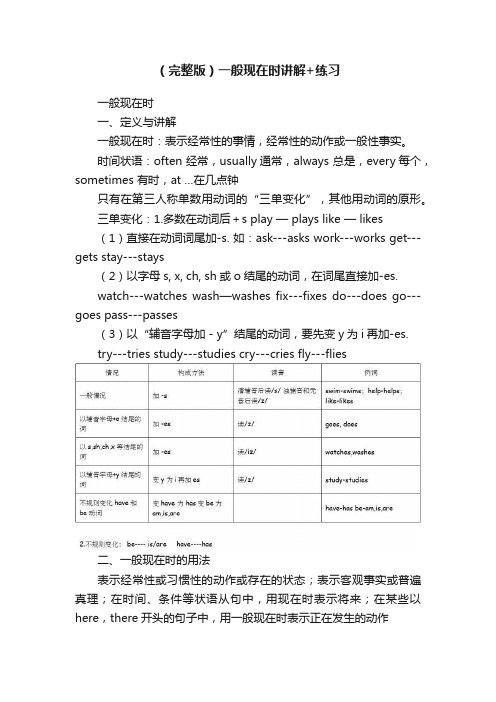
(完整版)一般现在时讲解+练习一般现在时一、定义与讲解一般现在时:表示经常性的事情,经常性的动作或一般性事实。
时间状语:often 经常,usually通常,always 总是,every每个,sometimes 有时,at …在几点钟只有在第三人称单数用动词的“三单变化”,其他用动词的原形。
三单变化:1.多数在动词后+s play — plays like — likes(1)直接在动词词尾加-s. 如:ask---asks work---works get---gets stay---stays(2)以字母s, x, ch, sh或o结尾的动词,在词尾直接加-es.watch---watches wash—washes fix---fixes do---does go---goes pass---passes(3)以“辅音字母加 - y”结尾的动词,要先变y为i再加-es.try---tries study---studies cry---cries fly---flies二、一般现在时的用法表示经常性或习惯性的动作或存在的状态;表示客观事实或普遍真理;在时间、条件等状语从句中,用现在时表示将来;在某些以here,there开头的句子中,用一般现在时表示正在发生的动作当主语是第三人称单数时:1、动词变相应的第三人称单数形式2、肯定句主语+动词s+其它3、否定句主语+doesn't+动词原形+其它4、一般疑问句Does+主语+动词原形+其它5、肯定回答 Yes,主语+does6、否定回答 No,主语+doesn't7、特殊疑问句特殊疑问词+一般疑问句当主语不是第三人称单数时:1、肯定句主语+动词原形+其它2、否定句主语+don't+动词原形+其它3、一般疑问句 Do+主语+动词原形+其它4、要注意,句式结构错则全都错。
5、谓语动词的形式:do/does一般现在时练习一、用所给词的正确形式填空1. We often ___________ (play) on the playground.2. He _________ (get) up at six o’clock.3. __________you _________ (brush) your teeth every morning.4. What____ (do) he usually _____ (do) after school?5. Danny _______ (study) English, Chinese, Math, Science and Art at school.6. Mike sometimes __________ (go) to the park with his sister.7. At eight at night, she ________ (watch) TV with his parents.8. ________ Mike________ (read) English every day?9. How many lessons ______your classmate____ (have) on Monday?10. What time ____his mother_________ (do) the housework?11. He often ______ (have) dinner at home. 12. Daniel and Tommy___ (be) in Class One. 13. We____ (not watch) TV on Monday. 14. Nick _____(not go) to the zoo on Sunday.15. They______ (like) the World Cup? 16. What ____they often ____ (do) on Saturdays17. Your parents________ (read) newspapers every day?18. The girl______ (teach) us English on Sundays.19. She and I _______ (take) a walk together every evening.20. There_______ (be) some water in the bottle. 21. Mike ______ (like) cooking.22. They_______ (have) the same hobby. 23. My aunt______ (look) after her baby carefully.24. You always____ (do) your homework well. 25. I_____ (be) ill. I’m sta ying in bed.26. She_____ (go) to school from Monday to Friday. 27. Liu Tao _____ (do) not like PE.28. The child often______ (watch) TV in the evening.29. Su Hai and Su Yang ______(have) eight lessons this term.30. -What day ______(be) it today? -It’s Saturday.31. Don’t make a noise. Grandpa __________ (sleep).32. Tom’s family__________ (watch) TV.33. It ________ (take) me two hours to finish my homework last night.34. What ______ your mother _______ (do) every evening? She_______ (wash) clothes.35. _______ it ______ (rain) every day?36. What _______ (do) you _______ on Sundays? We ________ (play) football.37. There ________ (be) a football match on TV every morning.38. They often ________ (visit) the Great Wall.39. Who _______ (dance) the best in your class?40. He _____________ (not come).41. The earth __________ (move) round the sun.42 She ________ (buy) a sweater.43. Mr. Wang often______ (go) to Shanghai.二、改句子1. Do you often play football after school? (肯定回答)_______________________________2. I have many books. (改为否定句)_______________________________3. Gao Shan's sister likes playing table tennis (改为否定句)________________________4. She lives in a small town near New York. (改为一般疑问句)________________________5. I watch TV every day. (改为一般疑问句)________________________6. David has a goal. (改为一般疑问句)________________________7. We have four lessons.(否定句)________________________8. Nancy doesn’t run fast (肯定句)________________________9. My dog runs fast. (一般疑问句) ________________________(把10—14小题变否定句,一般疑问句和划线提问)10. Mike has two letters for him. ________________________11. I usually play football on Friday afternoon.________________________12. Su Yang usually washes some clothes on Saturday. ________________________13. Mingming usually waters the flowers every day. ________________________14. Tom does his homework at home. ________________________三、写出下列动词的第三人称单数形式:1. wash_________ match _______ guess______ study______finish_________ go________ snow______ carry_________2. stop______ see________ drive ________let_______ carry______keep_____ join______ find_______ think________ teach______ catch______3. stay_______ begin______ forget_______ lie________ die _______run_______ prefer______ give________ ring_______ dance______ hope_______四、单项选择:1. There _____ an English film at the cinema now.A. will haveB. is going to haveC. is going to beD. is2. The picture _______ nice. A. looks B. is looked C. look D. is looking3. She ______ down and soon falls asleep. A. live B. lain C. laidD. sits4. They _____ the office in time very morning. A. reach to B. arrived C. went D. get to5. We shall go to Shanghai on business before you _____ back next week.A. will comeB. cameC. would comeD. come6. The plane ______ over there. A. is B. are C.am D. was7. I see her ____ the room this morning. A. to enter B. enteredC. enterD. enters8. The teacher ________us to come to school on time. A. ask B. asking C. asks D. asked9. John always ______ others. A. help B. helping C. helps D. to help10. He ______for eight hours every day. A. working B. to workC. worksD. worked11. You’d better ______ at home and ______ your homework.A. to stay, doB. stay, doC. to stay, to doD. stay, to do12. He sits down and ______ a rest. A. having B. have C. to haveD. has13. Uncle Wang never ______ a cake. A. make B. to make C. making D. makes五、请写出下列句子1.他每天早上七点乘公交车去上学。
初中英语语法八大时态总结及练习题
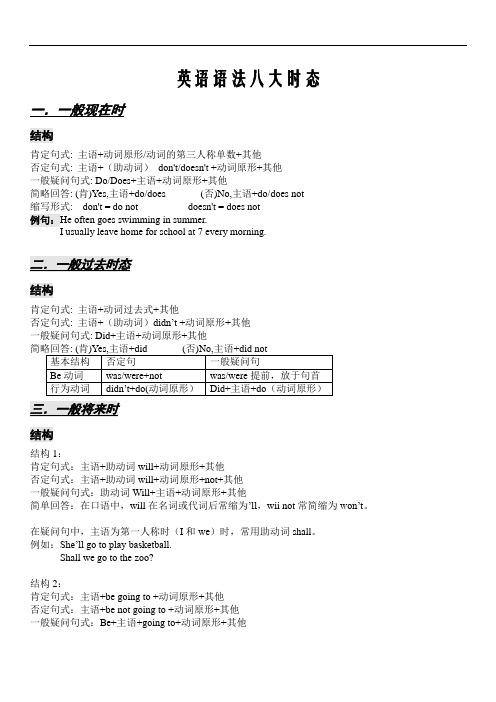
英语语法八大时态一.一般现在时结构肯定句式: 主语+动词原形/动词的第三人称单数+其他否定句式: 主语+(助动词)don't/doesn't +动词原形+其他一般疑问句式: Do/Does+主语+动词原形+其他简略回答: (肯)Yes,主语+do/does (否)No,主语+do/does not缩写形式: don't = do not doesn't = does not例句:He often goes swimming in summer.I usually leave home for school at 7 every morning.二.一般过去时态结构肯定句式: 主语+动词过去式+其他否定句式: 主语+(助动词)didn’t +动词原形+其他一般疑问句式: Did+主语+动词原形+其他基本结构否定句一般疑问句Be动词was/were+not was/were提前,放于句首行为动词didn’t+do(动词原形)Did+主语+do(动词原形)三.一般将来时结构结构1:肯定句式:主语+助动词will+动词原形+其他否定句式:主语+助动词will+动词原形+not+其他一般疑问句式:助动词Will+主语+动词原形+其他简单回答:在口语中,will在名词或代词后常缩为’ll,wii not常简缩为won’t。
在疑问句中,主语为第一人称时(I和we)时,常用助动词shall。
例如:She’ll go to play basketball.Shall we go to the zoo?结构2:肯定句式:主语+be going to +动词原形+其他否定句式:主语+be not going to +动词原形+其他一般疑问句式:Be+主语+going to+动词原形+其他简略回答:(肯)Yes,主语+be (否)No,主语+be not将来时其他表示法1)be going to表示将来表示说话人的打算、计划、安排或根据迹象判断必然或很可能发生的事情。
初中英语 语法 一般现在时讲解及练习精选

【一般现在时】(一)、1、表示现在的状态或经常、反复发生的动作2、客观真理,客观存在,科学事实例如:1)He is 12./ She is at home. 2)I go to school at 7:30 every day. 3)The earth moves around the sun.【注意】:肯定句变一般疑问时,句中的(am →are I → you my → your)例如:I am a student.(变为一般疑问句) -----Are you a student?This is my book. (变为一般疑问句) -----Is this your book?回答时,要用it 来代替this 和that。
不可回答Yes, this/that is. / No, this/that i sn’t.要用they来代替these和those。
不可回答Yes, these / those are / No, these / those aren’t..例如:1)Is this your pencil ? Yes, it is. It’s mine是的,它是我的(铅笔)。
2) Are those her keys? No, they aren’t. They are mine不那些不是。
那些是我的【过关练习】1、 This is my pencil .否定句 This ______my pencil .一般疑问句 ______ this______ pencil ?肯定回答 ____________. 否定回答. _____________2、Those are his boxes .否定句 Those ______his boxes .一般疑问句 ______those ______ pens ? 肯定回答 ____________ 否定回答 ____________3 、I am Helen否定句 ______ ______Helen .一般疑问句 ______ ______Helen . 肯定回答 ____________. 否定回答 ____________ .4、 A lot of keys are in the pencil—case .否定句 A lot of keys ______in the pencil—case .一般疑问句 ______a lot of keys in the pencil—case ? 肯定回答 ____________. 否定回答 ____________ .疑问式和简略答语Do/Does +主语+do动词原形+其它?Yes或No回答。
(完整)一般现在时讲解与练习(初中英语)
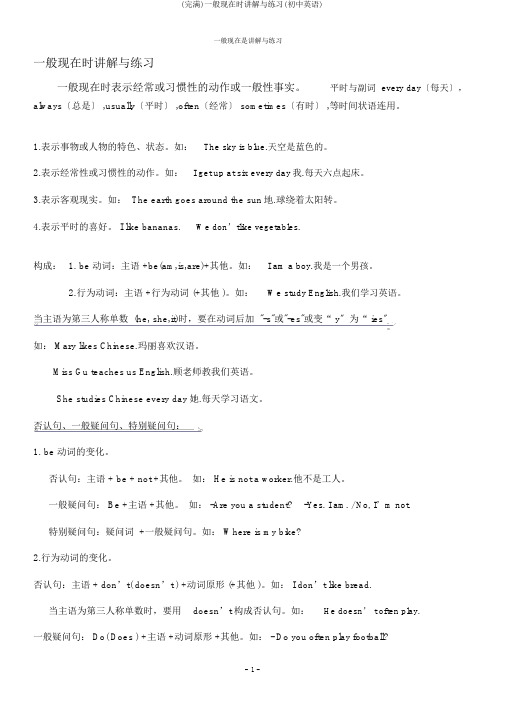
一般现在是讲解与练习一般现在时讲解与练习一般现在时表示经常或习惯性的动作或一般性事实。
平时与副词 every day〔每天〕,always〔总是〕 ,usually〔平时〕 ,often〔经常〕 sometimes〔有时〕 ,等时间状语连用。
1.表示事物或人物的特色、状态。
如:The sky is blue.天空是蓝色的。
2.表示经常性或习惯性的动作。
如:I get up at six every day我.每天六点起床。
3.表示客观现实。
如: The earth goes around the sun地.球绕着太阳转。
4.表示平时的喜好。
I like bananas.We don’tlike vegetables.构成: 1. be 动词:主语 +be(am,is,are)+其他。
如:I am a boy.我是一个男孩。
2.行为动词:主语 +行为动词 (+其他 )。
如:We study English.我们学习英语。
当主语为第三人称单数 (he, she,it)时,要在动词后加 "-s"或"-es"或变“ y〞为“ ies〞如: Mary likes Chinese.玛丽喜欢汉语。
Miss Gu teaches us English.顾老师教我们英语。
She studies Chinese every day她.每天学习语文。
否认句、一般疑问句、特别疑问句:1. be 动词的变化。
否认句:主语 + be + not +其他。
如: He is not a worker.他不是工人。
一般疑问句: Be +主语 +其他。
如: -Are you a student?-Yes. I am. / No, I’m not.特别疑问句:疑问词 +一般疑问句。
如: Where is my bike?2.行为动词的变化。
否认句:主语 + don’t( doesn’t ) +动词原形 (+其他 )。
初中语法重点:一般现在时的用法和练习详解附解析
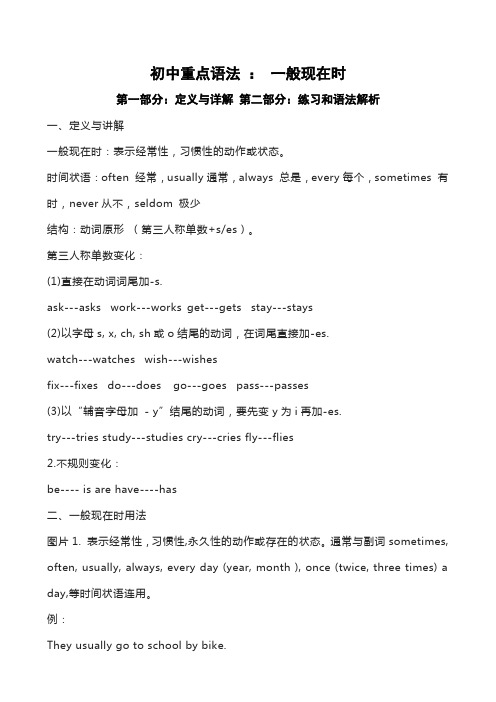
初中重点语法:一般现在时第一部分:定义与详解第二部分:练习和语法解析一、定义与讲解一般现在时:表示经常性,习惯性的动作或状态。
时间状语:often 经常,usually通常,always 总是,every每个,sometimes 有时,never从不,seldom 极少结构:动词原形(第三人称单数+s/es)。
第三人称单数变化:(1)直接在动词词尾加-s.ask---asks work---works get---gets stay---stays(2)以字母s, x, ch, sh或o结尾的动词,在词尾直接加-es.watch---watches wish---wishesfix---fixes do---does go---goes pass---passes(3)以“辅音字母加- y”结尾的动词,要先变y为i再加-es.try---tries study---studies cry---cries fly---flies2.不规则变化:be---- is are have----has二、一般现在时用法图片1. 表示经常性,习惯性,永久性的动作或存在的状态。
通常与副词sometimes, often, usually, always, every day (year, month ), once (twice, three times) a day,等时间状语连用。
例:They usually go to school by bike.I take the medicine three times a day.She helps her mother once a week.Mary’s father is a policeman.There are 50 students in my class.2. 表示客观真理,科学原理,自然现象,等客观事实或格言,谚语等。
例:The sun rises in the east and sets in the west every day.Tomorrow is Tuesday.三、一般现在时的句型转换(1)当句子中有be动词或情态动词时,则把be动词或情态动词(can,could等等)提到主语的前面变成疑问句;在be动词或情态动词后面加not变成否定句.例:①陈述句:She is a student.疑问句→Is she a student?否定句→She is not a student.②陈述句:I can swim.疑问句→Can you swim?否定句→I can not swim.(2) 当句子中即没有be动词,也没有情态动词时,则在主语前加助动词do (you,以及复数), does(单数she,he,it)变成问句;在主语后谓语动词前加助动词don’t(I,you,以及复数), doesn’t(单数she,he,it)变成否定句,助动词后的动词要变成动词原形。
(完整)初一英语一般现在时讲解及练习
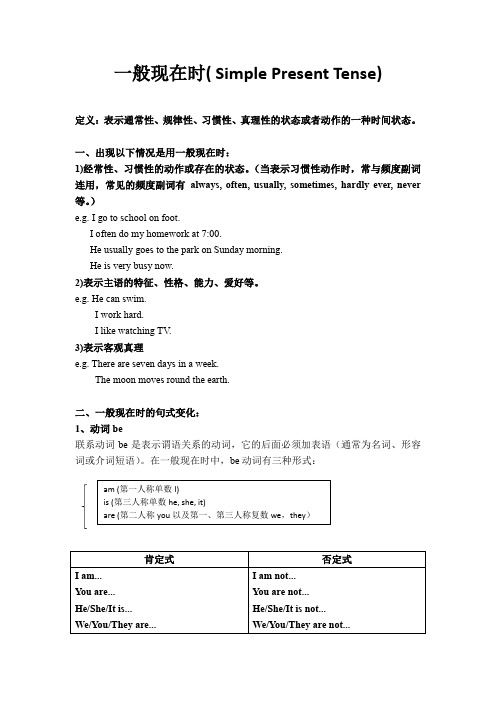
一般现在时( Simple Present Tense)定义:表示通常性、规律性、习惯性、真理性的状态或者动作的一种时间状态。
一、出现以下情况是用一般现在时:1)经常性、习惯性的动作或存在的状态。
(当表示习惯性动作时,常与频度副词连用,常见的频度副词有 always, often, usually, sometimes, hardly ever, never 等。
)e.g. I go to school on foot. I often do my homework at 7:00.He usually goes to the park on Sunday morning. He is very busy now.2)表示主语的特征、性格、能力、爱好等。
e.g. He can swim.I work hard. I like watching TV . 3)表示客观真理e.g. There are seven days in a week.The moon moves round the earth.二、一般现在时的句式变化: 1、动词be联系动词be 是表示谓语关系的动词,它的后面必须加表语(通常为名词、形容词或介词短语)。
在一般现在时中,be 动词有三种形式:一、用be的适当形式填空1.---How____ you? ---I____ fine.2.I___ David,and my family name___ Green.3.---What color ___ your clock? ---It___ white.4.---What___ this in English?---It___ an apple.5.Toy___my brother.David____my brother,too.They ___ my brothers.6.Look!These____apple trees.7.We____ good students and you____ good teacher.8.My sister and my brother_____ students.9. _____there many eggs in the kitchen?10.____your card number 5578?11.Where_____ your pencils?12.These sweaters ______ fifty dollars.13.How much ____ his jacket?14.My brother’s birthday____ December 11th.15.When _____ Kate’s birthday?16、There_____a boy and two girls beside the gate.17、Five and three ____ eight.二、.将下面的句子变成一般疑问句。
中考语法复习 — 一般现在时(附真题及解析)
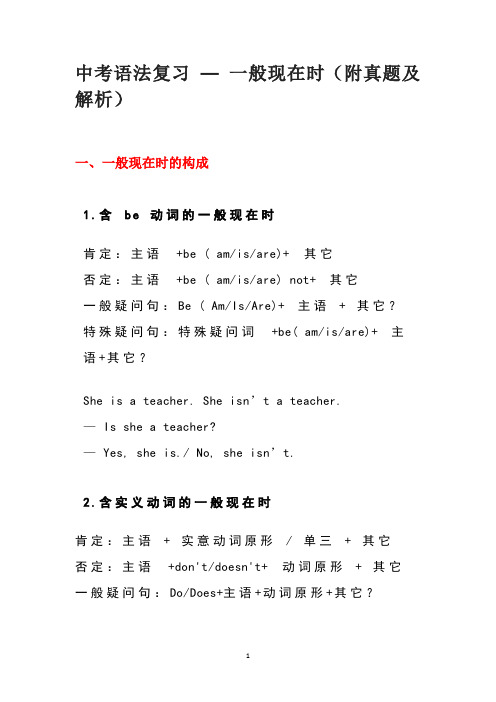
中考语法复习— 一般现在时(附真题及解析)一、一般现在时的构成1.含b e动词的一般现在时肯定:主语+be ( am/is/are)+其它否定:主语+be ( am/is/are) not+其它一般疑问句:Be ( Am/Is/Are)+主语+其它?特殊疑问句:特殊疑问词+be( am/is/are)+主语+其它?She is a teacher. She isn’t a teacher.— Is she a teacher?— Yes, she is./ No, she isn’t.2.含实义动词的一般现在时肯定:主语+实意动词原形/单三+其它否定:主语+don't/doesn't+动词原形+其它一般疑问句:Do/Does+主语+动词原形+其它?特殊疑问句:特殊疑问词+d o/d o e s+主语+动词原形+其它?Helen works hard.Helen doesn't work hard.— Does Helen work hard?— Yes, she does./No, she doesn't.How does Helen work?注意:在一般现在时的结构中,动词的形式由主语的单复数决定。
主语是第一人称或复数时,谓语动词用其原形;主语是第三人称单数时,谓语动词用单三形式。
现将动词单三的规则变化及其读音总结如下:二一般现在时的用法1.表示经常性或习惯性的动作,常与表示频度的时间状语连用。
如:My grandparents always take a walk in the park after supper.2.表示客观真理、客观存在以及科学事实。
The speed of light is faster than the speed of sound.光速比声速快。
3.用在表示格言或警句中。
Where there is a will, there is a way.有志者事竟成。
初中英语主要时态:一般现在时(讲解+练习)
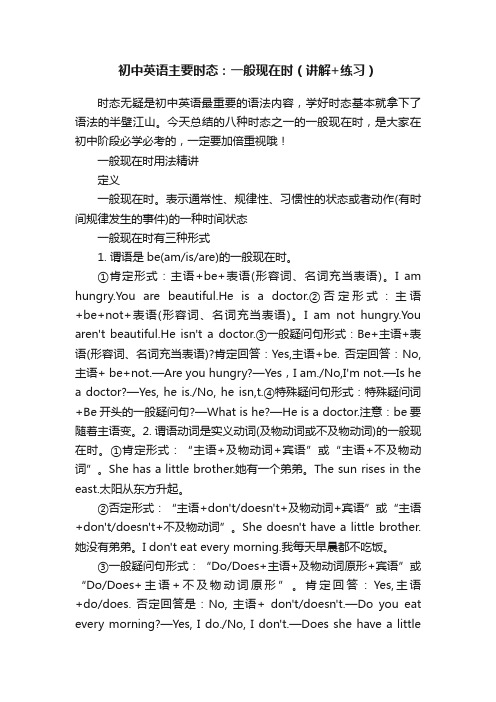
初中英语主要时态:一般现在时(讲解+练习)时态无疑是初中英语最重要的语法内容,学好时态基本就拿下了语法的半壁江山。
今天总结的八种时态之一的一般现在时,是大家在初中阶段必学必考的,一定要加倍重视哦!一般现在时用法精讲定义一般现在时。
表示通常性、规律性、习惯性的状态或者动作(有时间规律发生的事件)的一种时间状态一般现在时有三种形式1. 谓语是be(am/is/are)的一般现在时。
①肯定形式:主语+be+表语(形容词、名词充当表语)。
I am hungry.You are beautiful.He is a doctor.②否定形式:主语+be+not+表语(形容词、名词充当表语)。
I am not hungry.You aren't beautiful.He isn't a doctor.③一般疑问句形式:Be+主语+表语(形容词、名词充当表语)?肯定回答:Yes,主语+be. 否定回答:No, 主语+ be+not.—Are you hungry?—Yes,I am./No,I'm not.—Is he a doctor?—Yes, he is./No, he isn,t.④特殊疑问句形式:特殊疑问词+Be开头的一般疑问句?—What is he?—He is a doctor.注意:be要随着主语变。
2. 谓语动词是实义动词(及物动词或不及物动词)的一般现在时。
①肯定形式:“主语+及物动词+宾语”或“主语+不及物动词”。
She has a little brother.她有一个弟弟。
The sun rises in the east.太阳从东方升起。
②否定形式:“主语+don't/doesn't+及物动词+宾语”或“主语+don't/doesn't+不及物动词”。
She doesn't have a little brother.她没有弟弟。
九年级英语一般现在时语法精讲精练

九年级英语一般现在时语法精讲精练时态复习1.一般现在时(1)表示经常发生的动作、存在的状态或现阶段的习惯。
常用的时间状语有:always, often, sometimes, in the morning, every day, on Sunday等。
She is always ready to help others.她总是乐于助人。
(2)表示不受时间限制的客观事实或普遍真理。
Three plus two is five.3加2等于5。
Light travels faster than sound.光比声音传播得快。
2.一般过去时一般过去时表示在过去时间里发生的动作或存在的状态,也表示过去经常或反复发生的动作,常与表示过去的时间状语连用,如a few minutes ago, yesterday, last Sunday 等以及由连词when等引导的时间状语从句。
When I was a little child, I often went to play in that park.当我是个小孩子时,我常去那个公园玩。
3.一般将来时一般将来时表示将来发生的动作或存在的状态,也表示将来经常或反复发生的动作,常与表示将来的时间状语tomorrow, next year, in a few days, next Sunday, next week等连用。
I will go to my home town next week.下周我将去我的家乡。
4.现在进行时现在进行时表示此时此刻或这一阶段正在进行的动作,常与now, these days等时间状语连用。
They are learning Chinese in Beijing now.他们正在北京学汉语。
5.过去进行时过去进行时表示过去某一时间或某段时间内正在进行的动作或所处的状态。
While I was reading, my sister was playing.我在看书的时候,我妹妹在玩耍。
初中英语语法: 时态:一般现在时(超详细讲解、重难点归纳+练习、测试)

一般现在时一、定义(什么情况会使用一般现在时?):1. 表示经常性或习惯性的动作。
如:I get up at six every day.__________________________________________________________________________________________________________________________ 2.表示不会随时间发生变化的客观事实。
如:The earth goes around the sun.__________________________________________________________________________________________________________________________ 二、时间标志词:①每……:every week (day/ year/ month);on Mondays②……一次:once a week (day /month/ year)③频度副词:sometimes;usually;often;never;sometimes三、句子结构:①含有be动词:主语+ be(am/ is/ are)+其它。
★am用于I,are用于you,is用于非I、非you、非复数时。
如:I am a girl.She is my sister.__________________________________________________________________________________________________________________________ 1. 否定句:主语+be(am/is/are)+not+其它。
如:He is a worker→ He is not a worker__________________________________________________________________________________________________________________________ 2. 一般疑问句:Be+主语+其它。
2024年初中英语语法重点一般现在时的用法和练习详解

一般现在时(Simple Present Tense)表示经常性或习惯性的动作、客观事实、普遍真理等,下面详细介绍一般现在时的用法和练习。
一、肯定句的用法:1. 第三人称单数主语在一般现在时的肯定句中需要加s或es。
例如:- She studies English every day. (她每天学习英语。
)- He eats breakfast at 8 o'clock. (他八点吃早饭。
)2.一般现在时的肯定句中可以使用频度副词,表示动作发生的频率。
例如:- I often go swimming on weekends. (我经常在周末去游泳。
)- They always arrive early for class. (他们上课总是很早到达。
)3.一般现在时的肯定句中可以使用时间状语,表示动作发生的时间。
例如:- We usually have dinner at 7 o'clock. (我们通常七点吃晚饭。
) - The bus leaves the station every half an hour. (这辆公交车每隔半小时离开车站。
)二、否定句的用法:1. 将助动词do或does放在句首,再加上not构成否定句。
- She does not like coffee. (她不喜欢咖啡。
)- They do not play basketball on Sundays. (他们不在星期天打篮球。
)2. 第三人称单数主语在否定句中也需要加s或es。
例如:- He does not understand the question. (他不明白这个问题。
) - The bird does not sing in the night. (这只鸟不在夜晚唱歌。
)3.否定句中的频度副词和时间状语的位置也是在助动词后面。
例如:- I do not often watch TV. (我不经常看电视。
- 1、下载文档前请自行甄别文档内容的完整性,平台不提供额外的编辑、内容补充、找答案等附加服务。
- 2、"仅部分预览"的文档,不可在线预览部分如存在完整性等问题,可反馈申请退款(可完整预览的文档不适用该条件!)。
- 3、如文档侵犯您的权益,请联系客服反馈,我们会尽快为您处理(人工客服工作时间:9:00-18:30)。
一般现在时一、出现以下情况是用一般现在时:1)经常性、习惯性的动作或存在的状态。
时间标志词:often 经常,usually通常,always 总是,every每个,sometimes 有时,at …在几点钟e.g. I go to school on foot. He is very busy now.I often do my homework at 7:00.He usually goes to the park on Sunday morning.2)表示主语的特征、性格、能力、爱好等。
e.g. He can swim. I work hard. I like watching TV.3)表示客观真理e.g. There are seven days in a week.The moon moves round the earth.二、一般现在时的句式变化:1)表示动作,一般人称作主语的,变否定句须在动词前加助动词don’t;变一般疑问句须在句首加助动词do。
E.g.肯定句They have lunch at 12:00.否定句They don’t have lunch at 12:00.疑问句Do they have lunch at 12:00? 肯定回答:Yes, they do. 否定回答:No, they don’t.2)单三人称做主语的,变否定句须在动词前加助动词doesn’t;变一般疑问句须在句首加助动词does。
e.g. 肯定句:He goes to school by bike. 否定句:He doesn’t go to school by bike.疑问句:Does he go to school by bike? 肯定回答:Yes, he does. 否定回答:No, he doesn’t1. She ______ (go) to school at seven o’clock.否定句:一般疑问句:2. They usually _____ up at 17:00.(get )否定句:一般疑问句:3. Amy ____ (be) here just now.否定句:一般疑问句:实际操练1. I have many books. (改为否定句)2.Tom does his homework at home.否定句:一般疑问句:3.Mingming usually waters the flowers.否定句:一般疑问句4.Su Yang usually washes some clothes on Saturday.否定句:5. I usually play football on Friday afternoon.否定句:一般疑问句:强化训练一、写出下列单词的第三人称单数形式1. work__________ read__________ clean__________ write__________2. teach__________ wash__________ guess__________ watch__________3. go__________ do___________4. study__________ fly__________ cry__________ play__________5. have__________二.选择( ) 1. _____ you have a book?A. DoB. AreC. IsD. Have()2. They _________ on a farm.A.are workingB. is workC. workingD. is worked() 3. Does Peter like to watch TV?__________.A. Yes, he likeB. No, he doe sn’tC. Yes, he’d likeD. No, he likes( )4. She doesn’t __________ her homework in the afternoon.A. doingB. to doC. doesD. do( )5. How ____________ Mr. Brown ___________ to America?A. do, goB. is, goC. does, go D ()6. Where’s my camera? I____________ it.A. am not findingB. am not seeingC. can’t findD. can’t look at()7. How ___________ he go to work? He ___________ to work by bike.A. does; goB. do; goesC. do ; goD. does; goes( )8. ______ you usually late for school? No, _____________.A. Do; I amB. Does ;notC. Are ; I’m notD. Are ; I aren’t()9. _____ she _____ home at six every day?A. Is , leaveB. Does , leaveC. Is , leavesD. Does , left( )10. Mr. Yang ____________ English this term.A. teaches ourB. teaches usC. teachs usD. teach our三.用所给动词的适当形式填空。
1. My classmate ______ (know) the man on the bike.2. His sister usually ______ (go) to school at 7:00 am.3. Lin Tao ______ (like) his new sweater.4. Let me ______ (have) a look.5. Let’s ______ (play) tennis!6. ______ he ______ (like) English?7. I want ______ (go) to a movie.8. He ______ (not know) the teacher’s name.9. Nice ______ (meet) you!10. Can I ______ (ask) the policeman?11. ______ (sit) down and ______ (have) a cup of tea.12. ______ (not look) at your book!13. ______ you ______ (can see) the bananas on the table?14. I need ______ (buy ) some new clothes.15. She likes ______ (play) chess.16. It’s time ______ (play) games.17. You must v (be) a good student.18. She must ______ (sing) well.19. He ______ (have) an egg and a banana for breakfast.20. Li Min ______ (take) a shower after lunch.21. People usually ______ (eat) dinner in the evening.22. What time ______ Mary usually ______ (play) basketball ?23. This boy likes ______ (play) chess with his father on weekends .24. Where ______ his parents ______ (work) now, do you know?25. Who ______ (teach) you English in your school?26. Helen, ______ (not be) late for class again.27. I don’t like the movie. It’s ______ (born).28. ______ (not look) at the pictures. ______ (listen) to me.29. Little Tom can ______ (ride) a horse.30. The weather ______ (be ) windy to day.四、改句子1.Do you often play football after school? (肯定回答)2. He doesn’t have any paper.(改为肯定句)3.Gao Shan's sister likes playing table tennis (改为否定句)4.She lives in a small town near New York. (改为一般疑问句)5.I watch TV every day. (改为一般疑问句)6 We have four lessons.(否定句)7. Nancy doesn't run fast (肯定句)8. .Mike has two letters for him. (一般疑问句)9. Daniel watches TV every evening.(改为否定句)10.I do my homework every day.(改为一般疑问句,并作否定回答)11. She likes milk.(改为一般疑问句,并作肯定回答)12. Amy likes playing computer games.(改为一般疑问句,并作否定回答)13. We go to school every morning.(改为否定句)14. Simon and Daniel like going skating.(改为否定句)15. I watch TV every day. (改为一般疑问句)。
